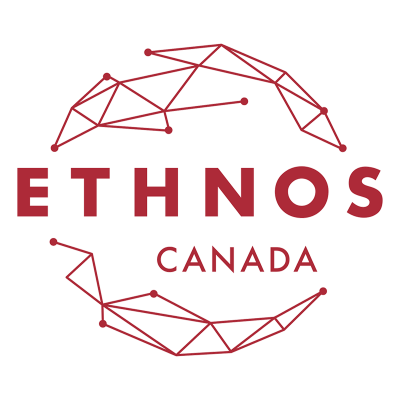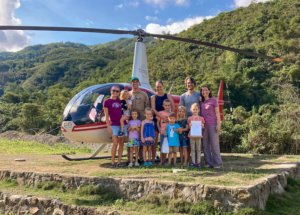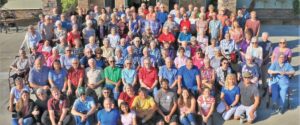“This whole 20-plus years that I worked on it, I felt overwhelmed much of the time, and it felt like it was never going to end. But now, on this very week that I am writing this, the first printing of the Bru New Testament, including portions of the Old Testament, is actually in our hands!”
Authority of The Word
The Word of God is central to the existence and identity of Ethnos and our Global Partners. Our first core value states, “We value the Word of God as our final authority.” We hold it to be “the sole foundation for faith and practice of all believers.”
Furthermore, God’s Word is central to our focus of church planting. God communicates with His people today through the written Word that He has given us. Our Handbook for Global Partner Bible Translators, developed over the years, emphasizes, “It must be the conviction of all our church planters that we cannot establish New Testament churches without the written Word of God.” As Ethnos missionaries teach, they ought always to remain cognizant that “the authority of our teaching is derived only from the written Word of God.” God’s Word, translated into and printed in the heart language of a people, serves as a visual reminder to those people that God desires to communicate with them and that He does so through His written Word.
Our translator’s handbook further emphasizes, “When no Scripture base exists in the language where a church is to be planted, Bible translation then becomes a life-giving essential, a fundamental part of the church planting process.” In fact, as we determine where best to send missionaries, we give the highest level of priority to people groups who do not have God’s Word accessible to them in their heart language. And as churches mature, it is our desire that they too will know the importance and authority of God’s Word for them. We seek to impart this principle from the very first.
Clark and Mary Spent countless hours of work translating.
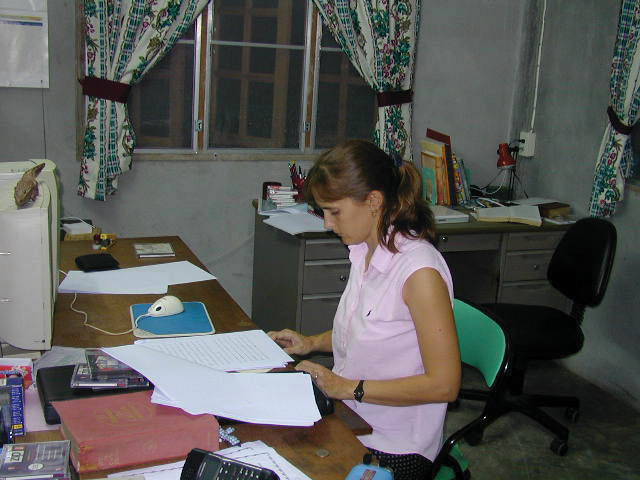
Did the Bru People Need a Translation?
Clark and Mary A began their ministry among the Bru people of Southeast Asia Mainland in 1989. “Initially, there was some question of whether or not they even needed a translation,” Clark said. Early in their ministry, the Bru people were using the national language Bible. Was it necessary to invest all the years of work translating the Scriptures into the Bru language?
Among the Bru people, there was a high level of literacy in the national language. However, the nature of the national translation combined with the culture of the Bru answered that question. Though the answer is multifaceted, it was clear that a translation of the Scriptures into the Bru language was necessary.
What Makes a Good Translation?
Ethnos and our Global Partners hold that a good Bible translation must “accurately convey the meaning of the original text being translated” and “will be in the language actually spoken by those for whom the translation is intended.” When translation is done well, the reader “will be able to comprehend the same meaning as the original audience did.”
Progress In Bru
Circumstances left the A family as the only missionaries to the Bru people. With Clark both translating the Scriptures and teaching the Bru people, progress was significantly impeded. How would the work ever be accomplished? Mary wondered. Clark asked Mary to take on the role of translator.
“This was not the answer I was looking for,” Mary said. Homeschooling their children and having a full plate already, she didn’t know how she could accomplish such a mammoth job! Nevertheless, Mary accepted the responsibility.
“There was many a time when I realized that this task was way beyond my ability.” During those times, Mary was thankful for the translation teammate God had given her in her husband. “I believe God has given Clark a real gift in seeing the Word unfold and make clear sense.” Clark flagged translation decisions for review, and together they worked through them. Additionally, Clark did the content checking — ensuring that all the pieces of a verse were there and that nothing extra had been added.

How would the work ever be accomplished? Mary wondered. Clark asked Mary to take on the role of translator. This was not the answer I was looking for.
The Translation Process
Every verse that is translated goes through numerous steps. These steps can be divided into three sections: exegesis, transfer and testing.
Exegesis, again referencing our handbook for translators, is discovering the meaning of the text. Transfer is exactly what it sounds like, transferring the passage into the receptor language (the language being translated into). Transfer may be what you think of as translation, but it is only one part of translation. Testing is ensuring that the content matches that of the original and determining that it is understandable.
Translation Checking
Even after all of these steps have been completed, the translation is not yet done. It is said to be “ready to be consultant checked.” What is translation consultant checking?
Bob Clark describes it as “quality control for Bible translation.” Bob has translated the New Testament into the Tugutil language of Asia Pacific and now serves as a translation consultant, assisting translators around the world.
He states that consultants strive to ensure that the translation is clear, accurate and natural.
Bob expanded on those concepts. First, consulting ensures that “the translator has indeed communicated in the receptor language what they believe they have communicated to the native speakers.” Second, “the translated text is an accurate reflection of the original source text.” And third, “the translated text uses grammar, vocabulary and idioms that are natural-sounding to the native speakers.”
When the translation is ready to be consultant checked, the missionary would first “back translate” the passage. That is, they translate the passage back from the receptor language into, in this case, English for the consultant to evaluate.
“That English version is what we would send to our consultants,” Mary said. “They would look through that and make comments based on that. ‘Why did you say this here?’ or ‘I feel like you didn’t quite get this part of the verse here.’ We would correct those types of things even before [the consultants arrived on site.] And that was very comforting, knowing that there was another set of eyes looking out for what’s missing, what’s added.”
At this point, Bob travelled to the A family’s location to complete the translation check.
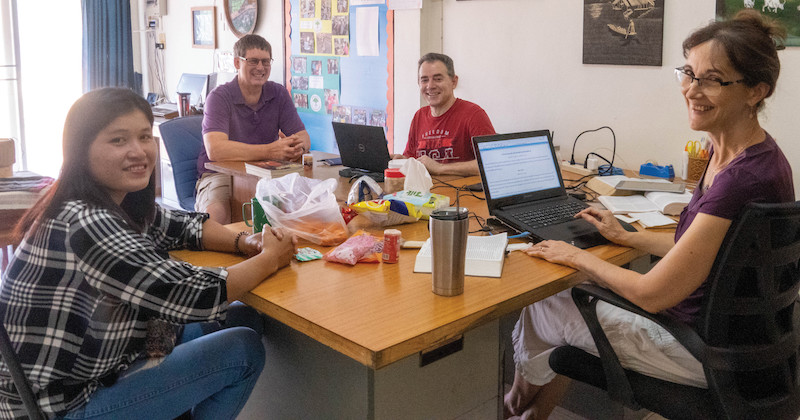
Now, why didn’t they understand that?
Where’s the confusion? How can we fix that?
“But this time, Bob would ask me to read a paragraph. I would read that to my helper, and then my helper would, in her own words, give it back, just from memory, from just having listened to it. And while she’s giving it back, Clark would be back translating that to Bob again in English.”
The consultant made notes of “what’s come back, what hasn’t come back and what’s different than what it should be.”
Later, after the translation helper left, Bob and the the A family would discuss areas of confusion or parts that could be done better. “And then we might try something the next day when the helper comes back again, before we go on to the next section,” rereading with recent changes. If the meaning then became clear to the translation helper, the A family knew that the roadblocks to understanding in that section had been removed.
Translation checking, like all of Bible translation, is very time consuming. “Checks can take between three days and three weeks, depending on the amount of translation that needs to be checked,” Bob said. As an example, he mentioned that the book of Acts may take about 10 days to check its approximately 1000 verses of narrative text. But “epistles, since they are a more challenging genre, take more time to check a similar number of verses.”
Translation consultants provide input to the translators over the course of their years of translation. And most times, multiple translation consultants are involved through those years.
Translation in the Family
Bible translation is not just part of Mary’s legacy. It’s a part of her family’s heritage.
Mary’s father, Don Schlatter, translated the New Testament into the Lawa language of Southeast Asia Mainland. The translation was started in 1957 and was completed in 1971.
Don translated Old Testament portions and printed copies at various times. Ultimately, the Old Testament was completed as well. In 2001 another printing was done with the complete Old and New Testament.
Mary’s brother-in-law and sister, Mark and Rachel Steffen, translated the New Testament into the Adasen language of the Philippines. It was printed in 1990.
Throughout the process of translation and translation checking, it is critical to work with native speakers of the receptor language. They are the experts in their language, Bob pointed out. They know the grammar, vocabulary and idioms.
One of the language helpers who stands out to Mary is MaeJo. MaeJo, along with her son Kajum, helped Mary draft the translation and perform comprehension checks. Mary liked it when MaeJo joined the comprehension check because of her giftedness.
“I wanted MaeJo to be there to help me think about, ‘Now, why didn’t they understand that?’ ‘Where’s the confusion?’ ‘How can we fix that?’”
“She definitely spent many hours with me and definitely is one of my dearest friends because of those hours we spent together.”
Virtual Consulting
Bob’s last three translation checks with Clark and Mary were done virtually. Bob worked from the USA while Clark and Mary resided in Southeast Asia Mainland.
Working virtually can bring limitations, but in this case, it was a success all the way around.
Everyone involved knew each other well already, including the Bru translation helper. This and their familiarity with the logistics of checking meant that they only needed to make a few adjustments. Clark and Mary laughed as they recounted, “We just set up a computer monitor where [Bob] would’ve sat anyway. His face would be on that monitor, just like he would’ve been there anyway. So, it wasn’t all that different. It worked out really well.”
Consultant Training
In line with Ethnos’ high view of the Word of God comes a high view of the responsibility of translators and translation consultants. Within Ethnos’ network of Global Partners, translation experience is only the first step to becoming a translation consultant. Additionally, they must exhibit aptitude, have linguistic abilities and understand cultural principles.
They continue learning through various workshops, in-depth study materials and multiple training sessions with other translation consultants. It is a long and arduous process from translator to translation consultant. Our goal is to make disciples by planting churches. Thus, a solid Bible translation that the people can read in their heart language is essential toward that end. Skilled consultants are critical to church planting.
Bru Bibles
As Mary mentioned at the beginning of this article, she and Clark now have the translated Bru Scriptures in their hands. By the time you read this, the Bru people should have it in their hands as well. As of this writing, the 1000 copies, printed in China, are on their way to Bangkok and then Chiang Mai. From there they will be sent on to the Bru Church.
“God’s Word is soaking into my heart and I am getting so much out of it.”
a Bru believer
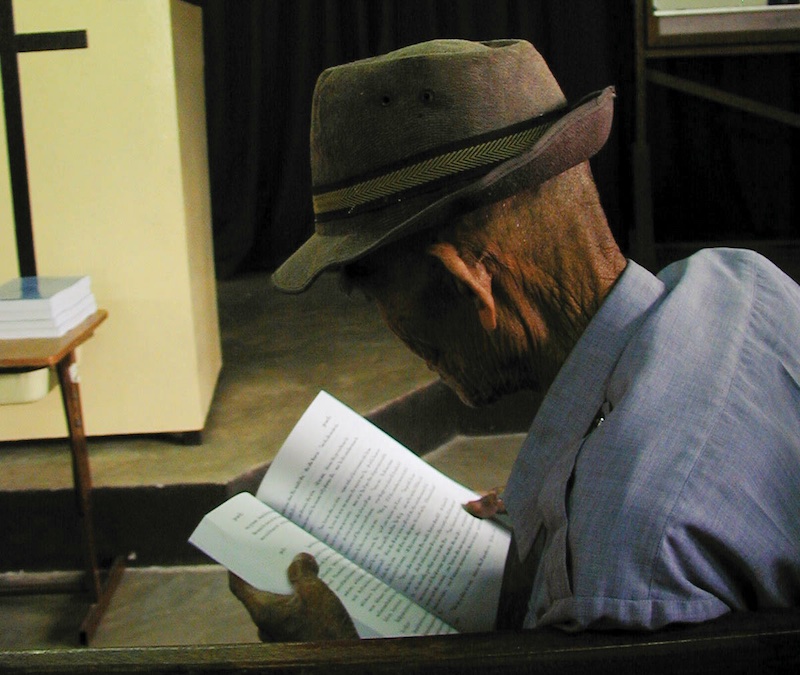
The Goal Achieved
Ethnos and our Global Partners seek, with the Church and as part of the Church, to make disciples of all nations. Putting the written Word of God into a people’s heart language is key to doing so.
“It really has been just an awesome privilege for us to be involved in that way,” Clark said. “I would say every check that we have, you hit those moments where the lights come on for your helpers. There’s nothing like when you see that truth just go ‘Bing!’ in their minds.
Literacy Among the Bru
Literacy is a necessary part of church planting, going hand in hand with translating the written Word of God into the heart language of the people.
Clark and Mary estimate that when they moved in practically everyone age 30 and below was functionally literate in the national language.
The sound sets of the national language and Bru are almost the same, with Bru having some additional vowel sounds. When the missionaries put the Bru language into a written form, they used the national script that the people were already familiar with.
“Because they could read the national language,” Clark said, “the jump to their mother tongue wasn’t that difficult for them.”
“Usually,” he continued, “with somebody that [is] literate in the national language, probably within a half hour of reading the Bru, they’ve got it.”
Amazing!
Bob has seen it firsthand too. “As a translation consultant, I often make my first visit into a particular people group before the missionary team has presented the gospel. And then my next trip might be about six months to a year later, when the gospel has already been presented and there is a small group of believers. Then another year passes before I visit there for another consultant check, and I can see the growth in the faith of the young believers and often a larger number of people who have placed their faith in Christ. During each visit, I get to see the reactions of these young believers as they are hearing portions of God’s Word in their own language for the very first time, as well as how their lives are changing in response to their understanding of God’s Word.”
Praise God for changing lives around the world through His Word!
